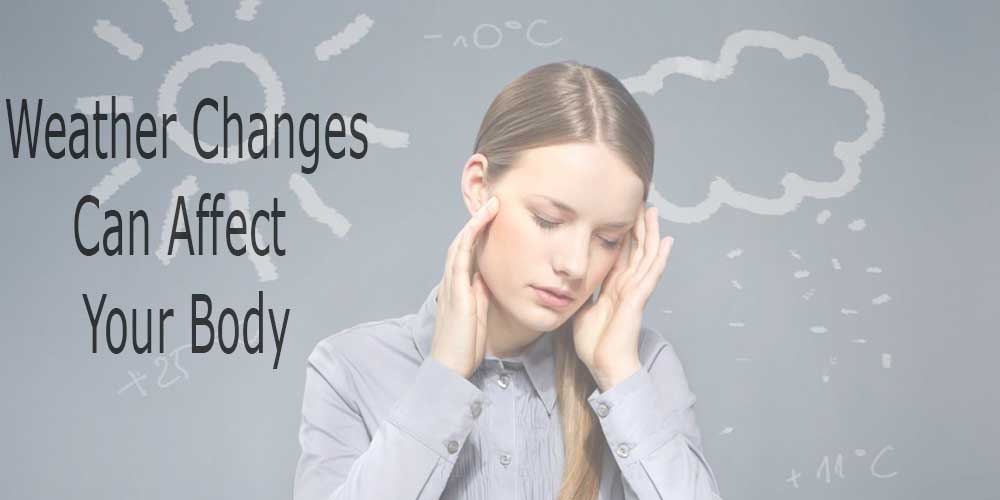The weather is an extreme force, but you might not understand just how powerful it is. Changes in the weather will impact the world around you, but it also affects your body.
If you didn’t know this, then you wouldn’t have correlated any ailments that you have with a shift in the weather. This might lead you to seek out solutions and treatments that cover up a condition rather than addressing the core problem.
A great example of this is weather-related headaches. You might blame your headaches on other things like caffeine intake, dehydration, or fatigue when it might be none of the above.
Simply understanding how impactful weather changes are can help you become more in tune with your body. You can be prepared and know what to expect as the seasons change, keeping you as healthy as possible.
We’ll go over some of the biggest ailments caused by weather changes below to get you started.
Navigator
Headaches
One of the most detrimental effects of changing weather is headaches and migraines.
The main reasoning for this is that changing weather means differences in atmospheric pressure. This pressure difference can affect you and cause headaches.
If you’re lucky, these will be fairly minor and just an annoyance. However, weather changes can also cause you to have migraines.
Migraines are a serious problem that will leave you debilitated. When you’re dealing with one, it’s difficult to think, move, or focus on anything. Additionally, you’ll have vision problems and your head will be in a lot of pain.
The most common weather changes for headaches and migraines are grey skies, storms, and high levels of humidity. These are all brought about by atmospheric pressure changes and directly affect your head.
Make sure to drink adequate water and have a basic painkiller like Tylenol available to ease your weather-related headaches.
Energy
Another important complication of changing weather is low energy.
Sunshine is necessary for your body to get vitamin D. This vitamin has several roles within your body and regulating your energy is one of them.
When the weather begins to sour, typically around the fall and winter seasons, there is less sunshine available. Not only that, but the days shorten and this will cause your body to experience more fatigue.
You might also suffer from a condition called seasonal affectiveness disorder. This causes you to fall into a depression during the fall and winter. You might be dealing with this if you’re symptoms ease with light therapy.
You’re greatly affected by changing seasons, likely more than you realize! You’ll inevitably lose some steam on rainy days while sunny days make you feel energized.
Consider using a light therapy lamp during darker months to help you feel better, both physically and mentally.
Dry Skin
Weather changes can also result in dry skin.
If you’ve ever noticed how your lips begin to crack and your face peels during the winter, then you’ll understand how this works. Dry skin is prevalent especially during the winter when it’s colder outside.
The reason for this is because cold weather has less moisture in it. As a result, less moisture is being absorbed by your body and this leads to dry skin.
Your face tends to be affected the most by this. Your skin will likely feel tight, uncomfortable, and sometimes painful.
While you can’t necessarily fix this, you should be prepared with plenty of lotion and lip balm during the winter! Don’t forget to drink plenty of water to make up for the hydration loss.
Achy Joints
One final significant impact of changing weather is achy joints.
This becomes particularly relevant if you already deal with joint pain because you’re prone to it. When the weather and atmospheric pressure changes, your joints are more sensitive to them compared to someone who doesn’t have joint problems.
Achy joints happen the most during cold and rainy days. This also speaks to how cold weather affects your joints.
When your body is cold, it requires more effort to move. This can make your body feel stiff, which will put added pressure on your joints when you move.
Regardless of what causes your achy joints, whether it be a sedentary lifestyle or arthritis, the weather can make it worse.
To combat this, be ready with heating pads and consider staying active to keep your body loose.
Closing Thoughts
Weather changes have serious impacts on your body that can cause you discomfort. This is usually a result of atmospheric pressure changing and your body picking up on that.
A few common ailments you might experience during weather shifts include headaches and migraines, lower energy, dry skin, and achy joints.
Most of these complications tend to arise during the fall and winter months. This is when it is colder and darker outside, which has the greatest impact on your body.
You can’t change the weather, but you can change how you respond to it. Understand that the weather will impact you and be prepared to react accordingly to ease any potential suffering!

